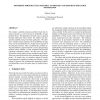108 search results - page 9 / 22 » Efficiently solving convex relaxations for MAP estimation |
CORR
2007
Springer
13 years 7 months ago
2007
Springer
We consider the problem of estimating the parameters of a Gaussian or binary distribution in such a way that the resulting undirected graphical model is sparse. Our approach is to...
ICML
2010
IEEE
13 years 8 months ago
2010
IEEE
Many structured prediction tasks involve complex models where inference is computationally intractable, but where it can be well approximated using a linear programming relaxation...
CIMAGING
2010
13 years 9 months ago
2010
The observations in many applications consist of counts of discrete events, such as photons hitting a detector, which cannot be effectively modeled using an additive bounded or Ga...
WSC
2008
13 years 10 months ago
2008
We consider a portfolio allocation problem where the objective function is a tail event such as probability of large portfolio losses. The dependence between assets is captured th...
JCNS
2010
13 years 2 months ago
2010
A number of important data analysis problems in neuroscience can be solved using state-space models. In this article, we describe fast methods for computing the exact maximum a pos...

